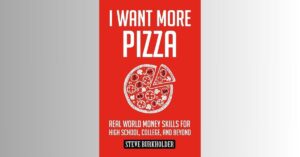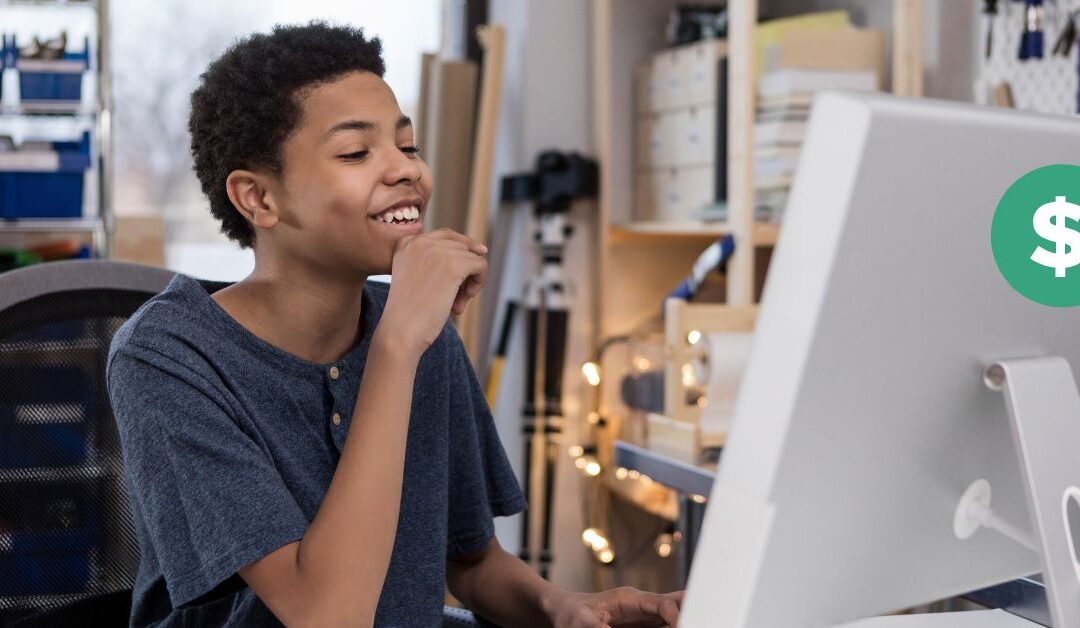Money mindset and the ability to overcome mental blocks can be a game changer in personal finance. So why not help your autistic teen develop a positive money mindset right from the beginning? Having a good money mindset can set your teen up for a successful future and a healthy relationship with their money. This is the focus of this Kids Money Skills financial literacy lesson for teenagers.
As a reminder, we are using the book I Want More Pizza: Real World Money Skills For High School, College, And Beyond (affiliate link) by Steve Burkholder. Steve is a certified public accountant and has worked in the finance department in higher education. He has a passion for teaching teens and young adults about personal finance, and I found his book a few years ago when looking for a good resource for my autistic teen J to learn about money.

If you missed Kids Money Skills, Lesson 1, you could always start with it first and come back to this second lesson.
Lesson #2: Helping your autistic teen develop a positive money mindset
Read the introduction (pages 5-12) of I Want More Pizza (affiliate link) with your teenager (either out loud or individually before the lesson).
Takeaways to share with your teen
- Earning money through babysitting, lawn mowing, or part-time jobs is great, but you need to learn how to make the most of that money.
- One of things you’ll learn in these lessons is the importance of saving money and seeing how it can grow over time. Steve provides a good example. If you save $25 each month, then that is $300 per year. If you continue to do that for 40 years, you will have $12,000. And that is without something called compound interest that would make it grow even more! (Don’t worry – we will talk about that later.)
- It’s important to understand that personal finance is “a set of tools that make it easier for you to keep your hard-earned money and to make it grow as quickly as possible.”
- Even though personal finance provides tools, money is emotional. So understanding your emotions and being able to overcome mental blocks can help you have a better relationship with money and make it work for you.
- Many people deal with money stress. Steve notes about 70 percent of Americans indicate they are stressed about money (according to the American Psychological Association.)
- Many people talk negatively to themselves and others about money. They put up blocks like “I don’t make enough money for that,” “I’m young: I’ll do it later,” and “I can’t understand it.”
- Increasing your knowledge about finance will help you have a positive money mindset and avoid the excuses that are mental blocks.
Discussion tips about money with your autistic teen
- Ask them what worries they have about money now and how do they think those cause mental blocks.
- Talk about your own money mindset and how you’ve had to overcome your own mental blocks when it came to money – even if you are still working on it!
- Ask your teen to describe what they think a positive money mindset is and what they can do to have this type of mindset.
- Plan a time for Lesson 3.
Practical Money Activity: Practice giving back change
Being able to count change is a practical money skill that not only will help your autistic teen with their own money but also a valuable skill for when they begin a part-time job. Many jobs that our teens have during high school and even college include accepting payment for services. When cash is paid, then they need to know how to calculate and provide change back to the customer!
For this activity, you will need:
- A calculator
- Small bills such as $1 and $5
- Coins (whatever you have on hand. We have a coin jar, so I use that.)
This activity is simple:
- Separate the coins into piles of pennies, nickels, dimes and quarters.
- Provide your teen with a few dollar bills.
- Give your teen a price that something costs that you are “paying” for and give them some cash. (For example, I’m “buying” something for $2.63, and I hand my son a $5 bill.)
- Have them use the calculator to determine how much change you are owed and then have them count out the change to give back to you.
- Repeat several times with different amounts to allow them to practice calculating and giving back change.







